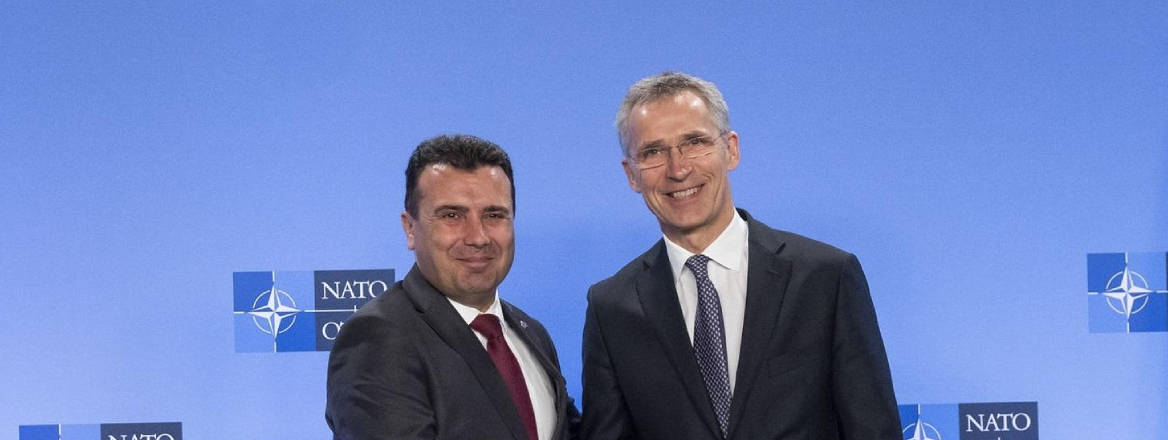North Macedonia: A New Member State and an Opportunity for NATO
The Alliance’s newest member could provide a bold and meaningful opportunity for NATO to show how serious it is about its 2030 initiative.
North Macedonia formally became a NATO Member State on 27 March 2020, with little pomp and a modest ceremony three days later at NATO headquarters in Mons, Belgium. The Balkan state is one of the smallest in NATO and has an active military strength of approximately 8,000 personnel. However, that does not mean its importance should be overlooked.
What has NATO done to bring the newest member into the fold, and what has North Macedonia done itself to contribute? Six months since its accession and the answer is that very little – if anything – has happened. Of course, the coronavirus pandemic intervened, but considering the emphasis on integration, partnerships and alliances in policy documents like the UK’s Future Force Concept, this inactivity is surprising.
The Work Is Not Over
It was not an easy journey for North Macedonia to join NATO. Russia strongly opposed North Macedonia’s accession, and while unsuccessful in stopping it, is still likely to have strategic goals in the small Balkan state. While there is currently no evidence to suggest that Russia will compete with NATO through North Macedonia, if the opportunity presents itself Moscow may seek to cause problems for NATO in the country. Indeed, the accession of North Macedonia may have provided Russia with an opportunity to test the Alliance’s unity and commitment to defend a fellow member.
Therefore, a more robust NATO action plan for North Macedonia is required. But North Macedonia has not been active in defining its own role in the Alliance. The country has its own issues to resolve such as improving ethnic relations, reducing unemployment and fiscal challenges and it may not be fair for the burden to be on North Macedonia to take the initiative. Yet, North Macedonia has contributed militarily to NATO in the past so the potential for a reciprocal partnership is by no means impossible.
The Onus Is on the Alliance
NATO has considerably more resources to hand – it just remains for the Alliance to use them. The NATO 2030 programme presents an ideal occasion for the Alliance to make a statement and commit to a more robust plan for North Macedonia. On 8 June 2020, NATO’s Secretary General Jens Stoltenberg, launched the NATO 2030 outline which emphasises NATO’s ambition to exploit opportunities and innovative approaches.
North Macedonia may provide these opportunities to NATO. It can show that joining NATO is a worthwhile act – more than an Article 5 insurance policy that may or may not be called upon – and that there is something to be gained by both parties. North Macedonia could be used as an example to show that size and limited resources are not everything and remove the perception that the focus for NATO is almost exclusively on its larger members such as the US, the UK, France and Germany.
Investing in North Macedonia does not interfere with the ambitions of larger Member States and is therefore unlikely to create tension between them. It is worth noting that Russia does have a declared interest, signalled by sending its Deputy Minister of Industry and Trade to Skopje in November 2019 where there was an agreement to widen cooperation in agriculture, energy and transportation, and explore other areas as well. Expanding NATO’s presence may provide a legitimate opportunity for NATO to monitor Russia’s activity there.
In North Macedonia, NATO could invest in a base, training mission or even a technology centre. Of course, other Balkan members could offer the same basing opportunity and some of these suggestions may be dismissed as purely symbolic. But symbolism matters, and North Macedonia needs this boost more than other NATO members in the region if it is genuinely to feel it has joined this inclusive club for a reason. As the Alliance faces an array of sub-threshold threats, its political cohesion remains critical for ensuring the access and unity to deter adversaries.
NATO did well by admitting North Macedonia. The promise of membership was a powerful incentive for the country to settle its longstanding differences with its neighbours, as well as an indication of the Alliance’s determination to uphold security in the Balkans. But the work is far from done, and the steps required to shape North Macedonia’s future in NATO are still to come.
Mark Proctor is a brigadier in the British Army and the Chief of the General Staff’s Visiting Fellow at RUSI.
The views expressed in this Commentary are the author's, and do not represent those of RUSI or any other institution.

